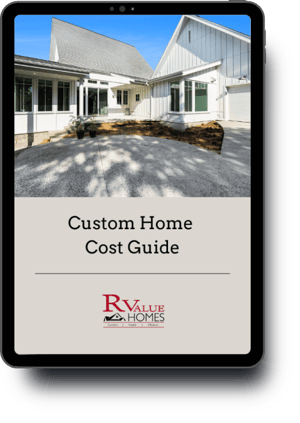4 Min Read
How To Build a Net-Zero Custom Home in Grand Rapids
Bring balance into your life every day by building a net-zero home. Whether you’re looking to remove yourself from the grid or leave the smallest footprint possible, net-zero homes are a lofty goal in green residential technology that is becoming more popular every year.
R-Value Homes builds attractive and durable custom Insulated Concrete Form homes throughout West Michigan, making us leading champions of green building across West Michigan. Sustainability in Michigan requires planning to meet the challenge of every season with the right insulation and exacting engineering, resulting in rock-solid homes that stand the test of time.

What is Net-Zero?
Net-zero is a term often used in conversations about green homes, but what does Net Zero really mean?
Generally speaking, the term refers to net-zero energy; but we are starting to see it used to describe net-zero carbon, also known as carbon neutral. The focus of this article is net-zero energy.
Over the course of a year, net-zero energy homes produce as much energy as they consume. Some net-zero homes actually produce more energy than they consume, which can make them even better than carbon neutral.
Net zero is sometimes also called zero-energy. Both are distinctly different than off-grid. An off grid home needs to produce all the electricity they consume over a course of days, even throughout the winter. Off-grid homes usually feature gas and wood heating and appliances; while net-zero homes are always fully electric.
Why Should I Build A Net Zero Home?
Don’t let the myths about energy-efficient homes scare you! Energy-efficient ICF homes are comfortable and clean. There are plenty of reasons to build a net-zero home. Net-zero homes are environmentally-friendly, reduce or even eliminate your energy bills, have a higher market value, and provide clean, quiet backdrops for your everyday experience.
How Do You Build a Net Zero Home?
Building a net-zero or zero-energy home is accomplished by first significantly reducing overall energy consumption at the same time as ramping up the comfort and health, then including a way to generate all the electricity the home needs to heat, cool, cook, light, etc.
Designing a Net Zero Home
Almost all of the heavy lifting of a net-zero home happens during the planning stage because precision matters and changes are more costly further into a build.
Start with Smart Design-Net-zero homes are designed to conserve energy. Size, layout, the orientation of your build relative to the sun, architecture, placement of each feature, and the number of windows and doors all impact your home’s ability to absorb and hold onto heat.
Optimize with Energy Modeling- We use third-party computer modeling during design to move or add windows, calculate the demand for fresh air, determine insulation types and amount, and much more before we finalize the blueprint.
Use Energy Wisely
Make it All-Electric- You can’t make your own natural gas, so heating and appliances that consume gas must be eliminated
Energy-Efficient Appliances and Lights-Look for opportunities to conserve energy by selecting energy-efficient heat pumps for heating and cooling, Energy Star kitchen appliances, natural daylighting, and ultra-efficient water heating.
Water Conservation- While not part of building net-zero per se, conserving water is a great partner to using less energy. Use low-flow fixtures and toilets and consider other opportunities to make use of greywater from taps and tubs for a fully eco-conscious home.
Super-Seal the Building Envelope
Triple Pane Windows- Don’t leak heat through your windows! Enjoy the extreme insulation and comfort of triple-glazed windows. We select from a number of different low-e coatings to allow the right amount of solar energy into your home.
Extra Insulation- Identify potential energy leaks like thermal bridges and ensure appropriate levels of insulation everywhere. Even in an ICF home where insulation is built-in, paying close attention to this pays dividends back of comfort, healthy air, and minimal energy usage.
Generate Your Own Energy
Solar Panels- The most popular method to generate electricity in net-zero residential properties is a photovoltaic (PV) array (a.k.a. solar panels). Most R-Value Homes custom builds include solar panels. Panel efficiency and longevity have continued to improve year after year, and they make a great complement to an ultra-efficient home. Nevertheless, solar panels is one of the higher cost items, which is why the majority of our effort and your budget goes towards reducing the loads--heating, cooling, appliances, etc. Every home we build is designed using energy modeling to determine the ideal level of panels versus building envelope improvements.
What is Net Zero Ready?
A zero energy ready home (ZERH) is built to conserve energy and features many of the above elements but does not yet include solar panels or another way to generate electricity. Nearly every R-Value home is built this way--with the energy efficiency optimized. This allows homeowners on tight budgets to add panels as their funds allow in the future.
Can I Convert My Home to Net Zero?
You can move your home to a zero-energy footprint step by step if you eliminate gas appliances, invest in green technology, increase or improve insulation, and generate and store your own energy. It’s always easier and less expensive to include these features the during construction, but renovating your home to approach net-zero is certainly possible.
How Much Does it Cost to Make A House Net Zero?
Net-Zero homes definitely cost more than an average code-built home, generally requiring an investment of about 10% - 15% more when building new. This number varies based on how much effort was put into optimizing the home design.
How Much Value Does Net Zero Add to Your Home?
Net-Zero homes cost less in maintenance and repair and have drastically reduced energy bills. This puts money back into the budget every month. Net Zero homes also command higher values on the market than their code-built counterparts.
Net-Zero Homes in Michigan Built to Perfection
Experience the ICF difference and invest in your future and your home's environment. R-Value Homes in Grand Rapids, Michigan, is ready to deploy our expertise and industry-leading craftsmanship to build your net-zero eco-friendly dream home. Give us a call today to schedule your initial consultation!





